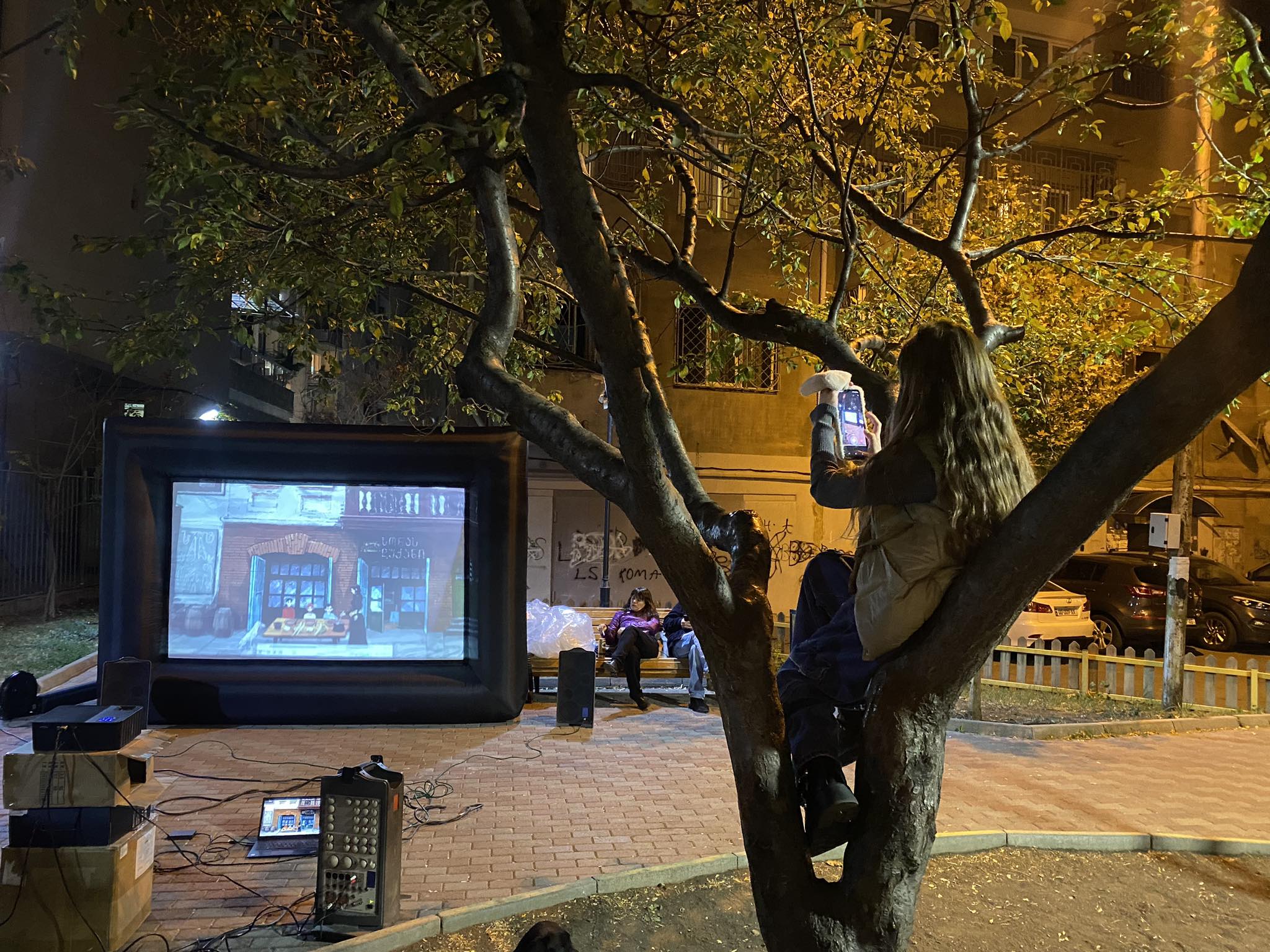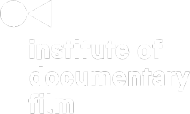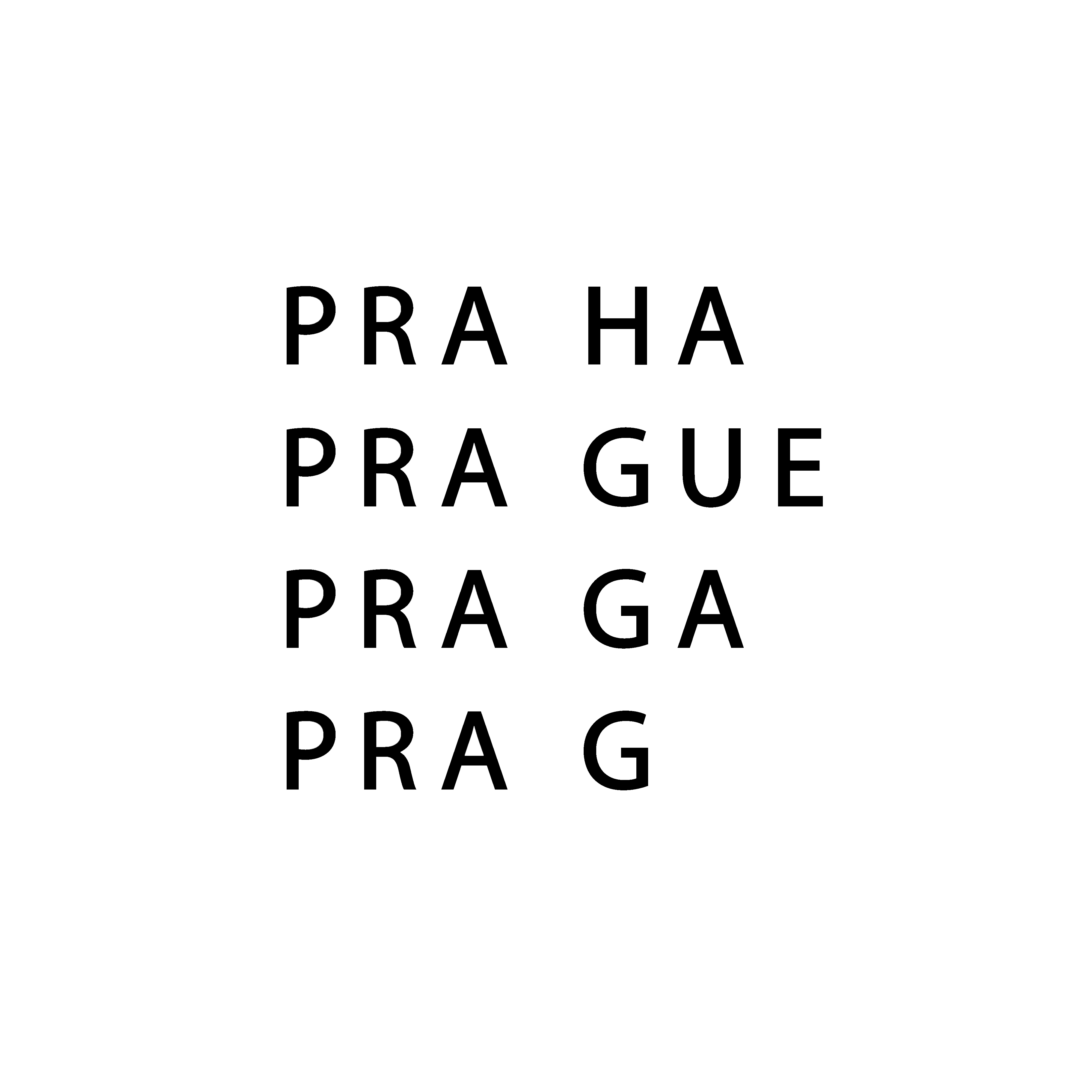How to Set Up a Screening Venue?
Editor: Hana Kulhánková
Discover the intricacies of organizing screenings step by step! Movies aren't just for theaters anymore; they can be shown in cafes, galleries, libraries, or even on a boat! With years of experience hosting screenings in unique places, KineDok is releasing a manual full of great advice and practical examples.
We interviewed dozens of cultural organizers in Czechia, Slovakia, Hungary, Croatia, Romania and Georgia and asked them to share their best practices with us. In the online publication, you can learn more about topics we discussed such as building a community, tackling technical issues, dealing with legal matters, promoting and communicating effectively, reaching out to new audiences, and planning the supporting program.

Are Documentaries Documenting?
This chapter explores the complex nature of documentary films and the issues surrounding their definition. It discusses the influence of creative processes on reality and the subjectivity of filmmakers. The text also introduces KineDok as an innovative platform enabling debate between filmmakers and audiences. The author emphasizes the collective nature of film and the power of community sharing that KineDok brings.
František Horvát
He graduated in Theory and Practice of Audiovisual Arts at the Tomas Bata University in Zlín and during his studies he repeatedly led the production of the festival REC FEST. For two years he was the head of the The Audiovisual Arts Studio at the same university. He works as a scriptwriter and programmer for, and in 2021 he founded the production company Zeroin. He is the producer of the film Island of Freedom and is currently preparing the premiere of the first feature film project from FMK UTB Return to Life.

Building Blocks of Your Community
The chapter focuses on building blocks of your community. Organizing a cultural event with a documentary film means doing it for people who see it, enjoy it, and have a discussion with others. Only in this way do the films manage to connect not only different themes and phenomena but also people from different backgrounds. Being part of the KineDok network means creating and strengthening a community of people who enjoy documentary films because these films reflect their own lives, broaden their knowledge about the world, initiate discussions about complex issues, and create space to share, connect, and laugh together. In this chapter, we will focus on the community-building aspect of screening films as a community is not something that spontaneously arises but has to be built up gradually. Let's get started.
Veronika Hanáková
She is a graduate of Film Studies and New Media at Charles University in Prague. In the past, she has collaborated with film festivals in the Czech Republic, be it the Ji.hlava International Documentary Film Festival or the Mezipatra Queer Film Festival. She is currently working on the cultural program of the Hybernská Campus, which is also the location of KineDok.

On Diversity of Venues
The chapter explores the diverse range of spaces where documentary films can be screened. From traditional cinemas to unconventional venues like cafes, galleries, and open-air cinemas, the possibilities are endless. Despite this wide universe of venues, the chapter finds common ground in the importance of the organizer and the Do It Yourself (DIY) attitude that pervades the entire KineDok community. This DIY attitude is what makes KineDok unique and has helped it become a hub for documentary film enthusiasts.
Szabolcs Szirony
Born in Budapest, he graduated in Cultural Anthropology from the University of Miskolc. He organized a community documentary cinema showcasing young Hungarian directors in clubs around Budapest, later expanding to international films. Co-founder of Budoku Budapest Documentary Festival, he helped it grow into a major event. Currently involved in Verzió International Human Rights Documentary Film Festival, Hungarian KineDok, and teaching documentary film theory at the University of Szeged. Also directing his debut feature-length documentary, he advocates for documentaries' power to offer intimate, reflective insights and expand viewers' understanding of the world.
Zsombor Szabolcs Pál
Zsombor Szabolcs Pál graduated in History. He works for a small publishing company and helps KineDok with making translations.

Navigating Technical Hurdles
With online film streaming and home cinema systems now so easily available, it’s more important than ever to create something the audience can’t experience at home. Cinema enthusiasts are often advised to go a step further and craft an event that the audience won’t easily forget.
However, the reality might be totally different for a country like Georgia, where it’s been almost 30 years since the last film was screened in more than 50 movie theaters. The young Georgian enthusiasts who aim at bringing new life and concept to the former Soviet cultural institutions in their small towns and villages face numerous technical challenges along their journey.
Mariam Jachvadze
She is a broadcast professional with more than ten years’ working experience in media. She graduated from the University of Westminster’s School of Media, Arts, and Design in London and worked as a video reporter and producer. She joined Chai Khana’s team as a Media Production Manager in 2019. She believes in the power of visual storytelling and has always been most passionate about telling stories that matter. She has experience working with international media such as BBC, The Wall Street Journal, and Vice News. She is also a co-founder and member of KSELI - network of organisations and people advocating revitalisation of abandoned cinema houses and cultural spaces in the regions of Georgia.

How to Pick the Right Films
Each season KineDok creates a catalogue of 12-16 films from which the local partners can choose to screen in their venues. Each organiser has their own creative process behind each event and the overall program which includes documentary films and accompanying events. Based on our experience, we identified seven criteria that should be taken into consideration when selecting the right films for a local KineDok programme.
Andreea Bratosin
Andreea Bratosin has over 12 years of experience in coordinating cultural projects. Since 2015 she is part of the One World Romania team, and coordinates the KineDok Romania program. Andreea is a promoter of documentary film and has facilitated numerous film screenings with discussions over the years.

Continuous Communication with the Audience
Every cultural venue is unique, just like every single film you screen. It has its potential audience. Who are they? Communication is one of the most important means in our daily lives. It is how we connect with each other, get to know each other, pass or exchange information. Paradoxically, with the advent of social networking and the development of media, communication has become much more challenging. In the information noise, it is necessary to be interesting. In order to not only reach out, but also catch the attention of potential visitors, it is important to have the right communication set up - properly targeted marketing and PR. As if it were tailor-made for your cultural space, but also for the film you want to screen.
Mária Hejtmánková
Since 2002 she has been involved in the production and PR of cultural projects. She has collaborated with the publisher K. K. Bagal, director P. Barabáš or with SkRAT theatre (Pro-téza theatre festival). She participated in the production of the documentary series Fetiše socializmu (research and PR). She was the PR manager for the film Anjeli (dir. R. Šveda), the International Animation Festival Fest Anča, the short film Žltá (dir. I. Šebestová), the series Chochmesovci, the documentary series Fetiše Nežnej revolúcie, the international festival of documentary films One World, the production studio Fool Moon (Mimi a Líza, Websterovci, Kamene) and helped with the PR of the film How I Became a Partisan (dir. V. Lacková). Currently she is PR manager of the literary award Anasoft litera and the festival Konvergencie, financial manager of the festival NEXT (Atrakt Art) and cooperates with the civic association ŽUDRO in the international music project Angrusori (PR, production/administration).

Dear Audience, Who Are You?
This chapter breaks down how to find and keep your audience by involving the community and focusing on film education, making bold programming decisions, and organising side events, being creative with promotional campaigns and turning your cinema into a living room.
Dina Pokrajac
Dina Pokrajac is a film critic, programmer and curator based in Zagreb. She works for Restart, an organization focused on production, education, distribution, and exhibition of documentary films as the manager of Dokukino KIC and the educational programme Masterclass. She is the artistic director of Subversive Festival, selector and DOXXL coordinator for ZagrebDox and has curated numerous interdisciplinary projects combining film and critical theory. She has edited over 20 books in the fields of philosophy, political science, and film theory. President of the Croatian Film Critics Society.

Film Screenings under Pressure
‘Georgian cinema is under threat,’ ‘Art is alive and independent’ these are the slogans you read and hear most frequently while discussing cultural landscape and its future in Georgia over the last couple of months. Film industry professionals have been organising protests against the actions of Georgia’s Ministry of Culture since mid-2023. The ongoing changes and reforms in the field might have a significant impact on the emerging field of new Georgian documentary cinema, and the struggle for the independence is still far from over.
Mariam Jachvadze
She is a broadcast professional with more than ten years’ working experience in media. She graduated from the University of Westminster’s School of Media, Arts, and Design in London and worked as a video reporter and producer. She joined Chai Khana’s team as a Media Production Manager in 2019. She believes in the power of visual storytelling and has always been most passionate about telling stories that matter. She has experience working with international media such as BBC, The Wall Street Journal, and Vice News. She is also a co-founder and member of KSELI - network of organisations and people advocating revitalisation of abandoned cinema houses and cultural spaces in the regions of Georgia.

Too Cool for School: Building Young Audiences
The following chapter describes several educational programmes developed for kids, teens, and young adults at Dokukino KIC in Zagreb, what the organisers learned from them and their efforts to encourage participation and democratise the film selection, production, and distribution process.
Dina Pokrajac
Dina Pokrajac is a film critic, programmer and curator based in Zagreb. She works for Restart, an organization focused on production, education, distribution, and exhibition of documentary films as the manager of Dokukino KIC and the educational programme Masterclass. She is the artistic director of Subversive Festival, selector and DOXXL coordinator for ZagrebDox and has curated numerous interdisciplinary projects combining film and critical theory. She has edited over 20 books in the fields of philosophy, political science, and film theory. President of the Croatian Film Critics Society.

How to Join KineDok
This short introduction to KineDok’s distribution system will help you create your own screening venue with the aid of our experiences and film catalogue. From the first baby steps to regular massive event-based screenings, we provide a 101 guide to building a community cinema.
Szabolcs Szirony
Born in Budapest, he graduated in Cultural Anthropology from the University of Miskolc. He organized a community documentary cinema showcasing young Hungarian directors in clubs around Budapest, later expanding to international films. Co-founder of Budoku Budapest Documentary Festival, he helped it grow into a major event. Currently involved in Verzió International Human Rights Documentary Film Festival, Hungarian KineDok, and teaching documentary film theory at the University of Szeged. Also directing his debut feature-length documentary, he advocates for documentaries' power to offer intimate, reflective insights and expand viewers' understanding of the world.
Zsombor Szabolcs Pál
Zsombor Szabolcs Pál graduated in History. He works for a small publishing company and helps KineDok with making translations.
We live the documentary film, be there with us.
Start each month with a fresh dose of information. Subscribe to the newsletter.
I hereby consent to the processing of the personal data.







